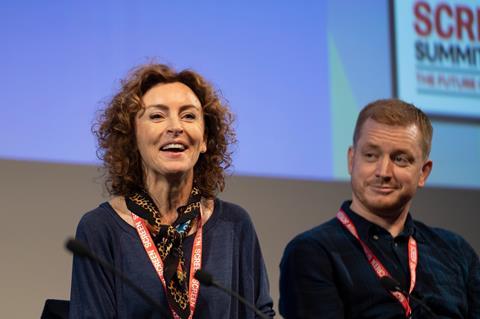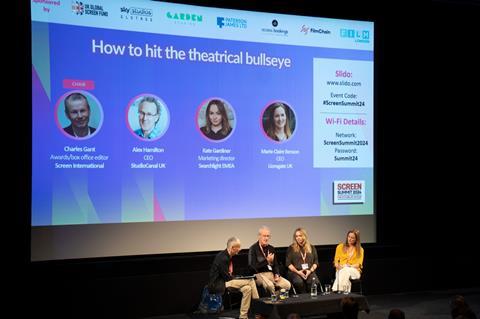Screen International’s ‘The Future of UK Film’ Summit brought together leading names in the industry to debate the challenges and define the opportunities for UK independent film
The urgent need for further support for UK independent producers, a requirement to identify and grasp emergent funding streams and better understanding of what audiences actually want were among the urgent calls to action from Screen International’s ‘The Future of UK Film’ Summit 2024, held on September 24 at BFI Southbank. Top executives from throughout the sector came together for panel talks and Q&A sessions, sharing stories from the industry frontline to inspire and galvanise.
Seven key themes emerged from the various conversations.
Save our producers

The summit began with fresh insights from the British Film Institute (BFI) and industry experts on how producers can best prepare for the anticipated introduction of the Independent Film Tax Credit (IFTC), otherwise known as the enhanced audiovisual expenditure credit for lower-budget films, by the UK’s new Labour government. Producers who otherwise might have shot their films abroad are now staying in the UK, while others have raised their budgets or closed the gap in financing.
But such welcome intervention is not enough and the challenges facing independent producers will become insurmountable unless addressed, said UK producers repeatedly, throughout the day.

“It’s a part of the industry that needs desperate support because if it doesn’t come soon, and the government doesn’t recognise the real state of the nation, there aren’t going to be many of us left,” said Glasgow-based producer Gillian Berrie of Sigma Films on the panel ‘UK Producers: State of the Nation’.
Dubbed by participants as the “doom and gloom” session, the panel also included Fiona Lamptey of Juno Studios, Mark Lane of Tea Shop Productions and Matt Wilkinson of Stigma Films.
The typical financing model from public funders needs to be completely rewritten in favour of the producer, said Berrie, so producers do not need to defer or completely use their fees to close the financing. “The shortfall is almost always the exact value of the producer’s fee,” said Wilkinson, through clearly gritted teeth.
“As an indie producer, and certainly as a lower budget indie producer, you need to be opportunistic,” Wilkinson added. “You need to be looking to the commercial sector for how you’re getting these films funded in the first place.”
More money please
There are sources of government financing for UK independents – but it is not enough. “We should be talking about film funds worth £65m, £100m – not £5m,” said Scotland-based animation producer Ken Anderson on a panel session heralding how the UK Global Screen Fund (UKGSF) is helping to facilitate international collaborations.
Looking for international funding sources is key. “We’re going to have to look outside these shores. That’s not a negative – that’s a positive,” said Cassandra Sigsgaard of Jeva Films, who said UKGSF backing had changed her whole way of thinking about making and financing films.
The call for the return of an EIS tax scheme for individual projects – or something similar – was sounded by several speakers.
“I’d love to see EIS come back to films because it’s been a disaster the way it’s been cut,” said Zygi Kamasa, founder and CEO of distribution and production outfit True Brit Entertainment, who recalled he made his first indie film for £300,000 in 1996 with an EIS scheme.
Money is out there – for certain films

Sunnier uplands for the UK film industry could be glimpsed from the perspective of the financiers on the ‘Money Talks’ panel on which Kamasa sat with Phil Hunt, CEO of Head Gear Films, Sébastien Raybaud, founder of UK-based production, financing and sales outfit Anton, and Julia Stuart, director at Sky Original Film.
“I’m optimistic,” said Hunt. “I’m seeing green shoots. I’m taking the risk and have been cash-flowing the new IFTC on 15-20 films in the past six months.”
“There is a positive atmosphere in getting movies off the ground,” enthused Kamasa. “We don’t fully finance film at True Brit but we put in the centrepiece financing and take UK rights. Our ambition was to do two or three films in the first year, and we’re in post-production on six movies. That meant not only were we able to find six movies we liked and felt were commercial, but the producers were able to raise the rest of the finance for those six movies. The tax credit seems to have helped.”
Raybaud, who recently secured more than €100m ($112m) to expand Anton’s genre film slate, said the audience, and therefore the money, is there for the right kind of film. The company is fully financing big European genre films, made in the UK, for which he says distributors (particularly in markets such as Germany and Benelux) are looking.
“Europe is thriving,” said Raybaud. “We’re seeing some high sales figures for LatAm too. But the US is brutal. So that’s the risk we take. Asia was terrible for a number of years, but we see signs now where it’s going back, especially in China.”
“I see France not buying much these days, or buying for heavy discount. Same with Korea. Same in Japan,” added Hunt, who also owns UK sales outfit Bankside Films. “My advice [to producers is] get really pally with a whole bunch of sales people because they understand what the market wants.”
Lamptey pointed to non-traditional avenues of funding: “There are lots of investors that want to get into our industry and don’t have the skills or expertise but have the money. That’s where producers come in. Our expertise is invaluable in this space.”
There is a drive to create healthy workplaces
All the producers agreed that money and time pressures make for tight schedules and, ideally, producers need to be on set every day to provide leadership.
“You want to be aware as much as possible about who may be struggling with what, or things you can do in the moment to change that,” said Wilkinson. “That’s not just being aware yourself, but working with a good line producer, working with a good production team, creating the idea that there is an HR. Sometimes in independent film that’s an invisible concept.”
But who is looking after the producer? Lightening the load can include working with experienced line and co-producers, hiring a good lawyer, securing a completion bond if needed and bringing on board a recoupment firm from the get-go.
“We can be the bad bear,” said Sheila Fraser Milne, founder and CEO of UK completion guarantor company Paterson James. “If you need to have a difficult conversation with your director or any of your team, or even sometimes with your financiers, you can talk to us, and then you have the ability to say, ‘Well, actually the guarantor says…’ and that enables you to keep a good relationship with your creative partners.”
Attaching bankable UK talent is hard but not impossible

The slowdown in global high-end TV production is helping indie producers access top talent, admitted Elizabeth Karlsen of Number 9 Films.
“The boom in TV series and because those had much longer schedules, did mean that having access to talent for individual films was tricky. There has been self-correction, probably for the wrong reasons, but that self-correction does mean that talent availability is easier than it was two or three years ago,” she said.
A talent agent will choose which projects to put in front of their clients based on the quality of the script, according to Jane Epstein of Independent Talent. “Whether it’s the writer, producer, director or another piece of talent attached to a good script.”
“When it comes to independent film, it’s always the director I look at, because it’s the director that makes or breaks it,” said actor-producer Jack Lowden, who recently wrapped John Maclean’s Tornado. “There’s a lot of brilliant directors out there, but then there’s a lot of directors [who] don’t know how to direct actors at all.”
The ruthless business of bankability is down to the value attributed to an actor by an international buyer in their territory. “Incorporated into that is whether that actor is willing to and will be able to generate enough press and do the marketing, whether the actor can contribute to the film being considered for A-list festivals, and whether they attract other actors to the film,” said Katie Ellen, head of production at HanWay Films.
“One of the biggest challenges now is that there are fewer global box-office stars,” she added. “Films might do well in English-language speaking countries, but then just not perform in Europe. One actor might over-index on their value in the US or the UK and Australia, but you need that because they don’t hold any value in Asia.”
Studios are looking for UK indie shoots
When it comes to where to mount a production in the UK, the biggest driver for producers is cost. The UK has experienced an uptick in studio facilities across the UK – and there is an appetite among the emerging studio operators to work with independent producers.
“If there are more choices, more competition, it helps the [local indie] producers,” noted Stigma’s Wilkinson.
Sustainability is also important to the facilities, as it is to producers – if it’s affordable. Newly expanded Sky Studios Elstree has invested up front in sustainable technologies such as air-source heating pumps, so the site is ready-to-go for productions.
“We want a production to come in and be able to plug and play,” said Sky Studios Elstree’s VP of strategy and business Sophie Owen Street.
She was joined on the ‘Future Production: How UK studios can work with independent producers’ panel by Bee Devine, COO of central London’s state-of-the-art Garden Studios, and Leo Pearlman, producer and founder of Fulwell 73 and managing partner at the £450m Crown Works Studios, to be built in Sunderland.
“We work closely with the producers to offer practical solutions, saving opportunities, innovation, technology solutions, and whatever else the producers need,” said Devine.
Pearlman added his aim with Crown Works was to build a facility that “puts the producer first, puts local first, one that offers a lower built-in cost base, being in the northeast, one that has a facility with a local crew base”.
‘Britishness’ is important at the cinema. But what is it?

Achieving the ultimate prize of a successful theatrical release was the thread that ran through each of the day’s conversations. Theatrical remains an important launch platform, both for the film’s potential revenue streams and as a marquee standard for filmmakers.
“For the right film, we will do a theatrical window,” said Sky Original Film’s Stuart, who has steered away from a day-and-date model.
As the big streamers and platforms remain interested in acquiring pay-1 rights for independent movies, a theatrical release can help raise the value. But reaching UK audiences with homegrown fare in cinemas is a tough ask.
“British films often don’t work at the local box office,” said Studiocanal UK CEO Alex Hamilton. “You’re always looking for something that’s going to work against the odds rather than because of them.”
Hamilton spoke on the ‘How to Hit the Theatrical Bullseye’ panel with Kate Gardiner, marketing director, Searchlight EMEA, and Marie-Claire Benson, executive vice president and head of Lionsgate UK.
“British values have to be evident [in our successful releases] and that might be subject matter and setting, or it could just be the tone of the writing,” said Gardiner. “There are great writers in Britain who write like no one else in the world, and that’s something that we really put a value on.”
Benson admitted defining ‘Britishness’ was not easy. “When I took over the role of overseeing the UK and asked the US, ‘What do you want me to look for?’, they said, ‘Just British.’ It’s so broad, British film. It’s vast, and I don’t want to be reductive. The job now is to try and broaden the scope of what that audience looks like by bringing in more stories.”















![[Clockwise from top left]: Paul Thomas Anderson, Chloe Zhao, Ryan Coogler, Park Chan-wook](https://d1nslcd7m2225b.cloudfront.net/Pictures/274x183/9/0/0/1467900_writerdirectors_192733.jpg)








No comments yet